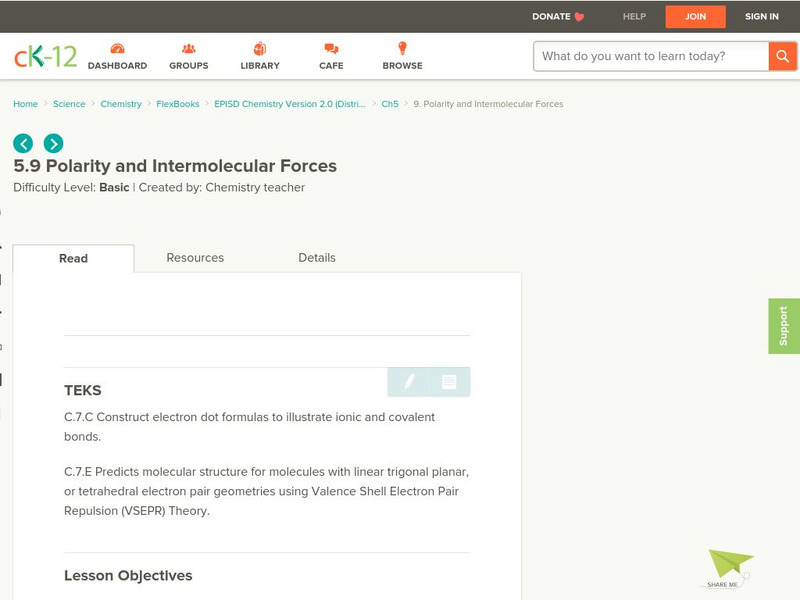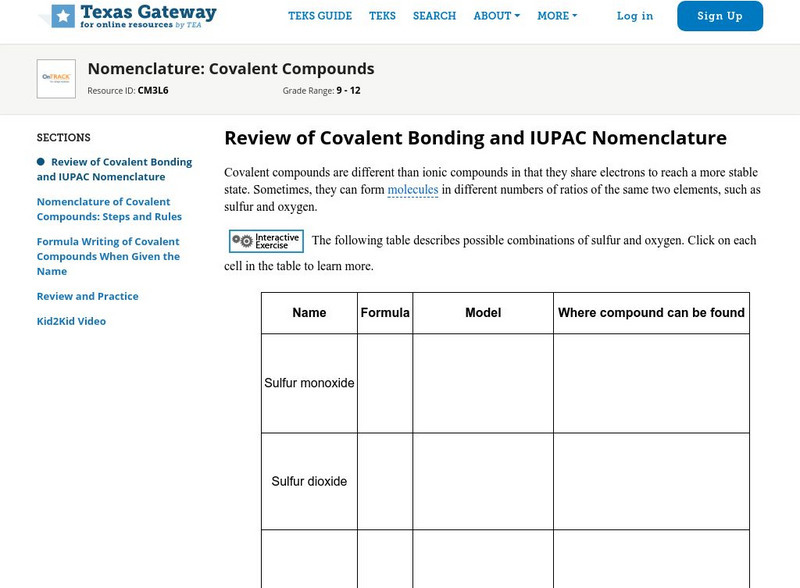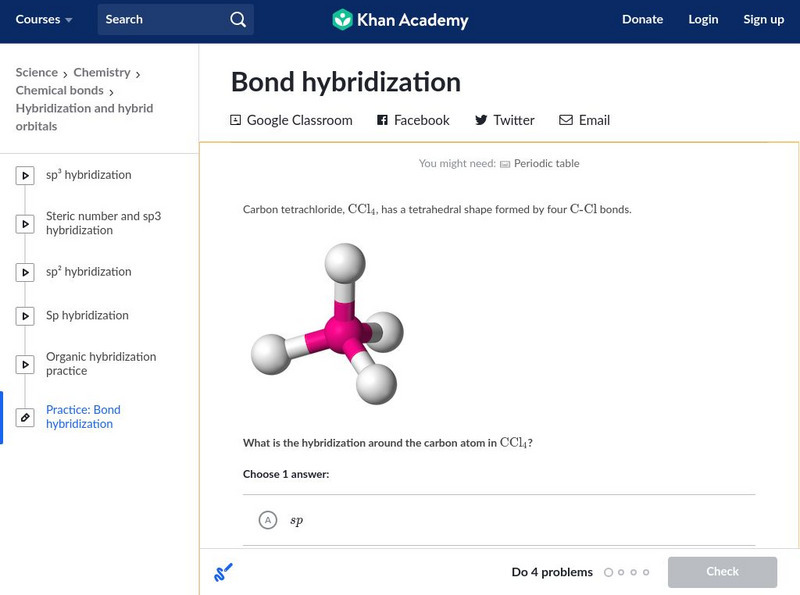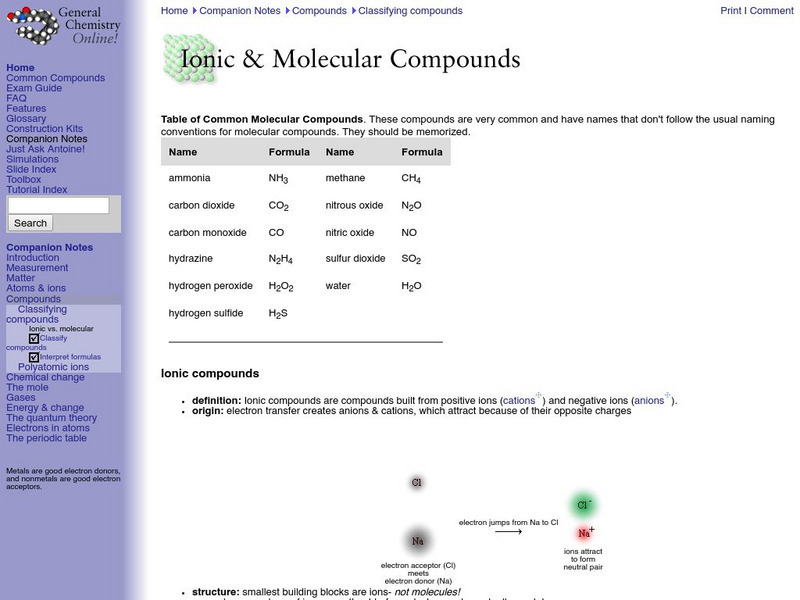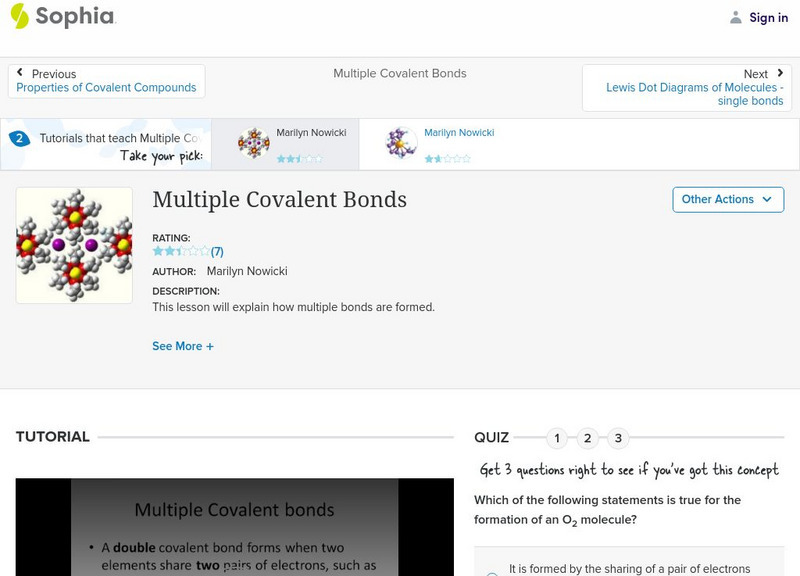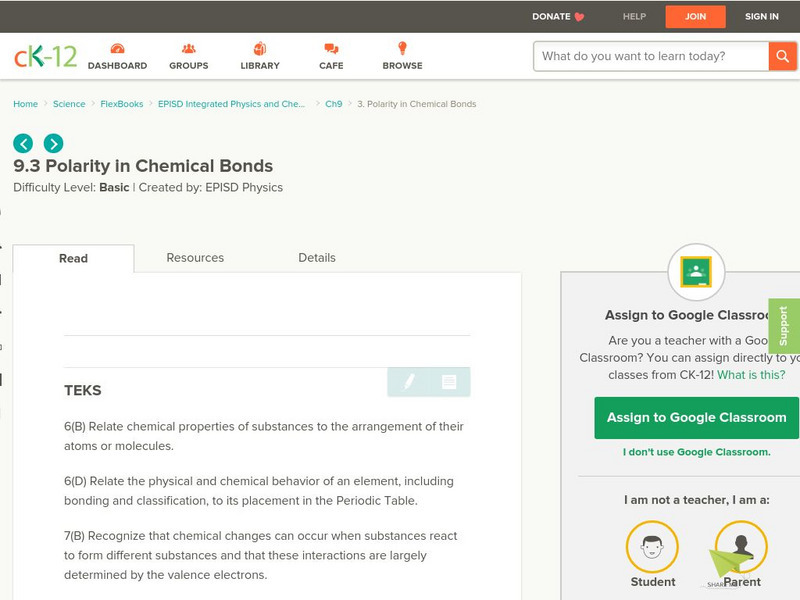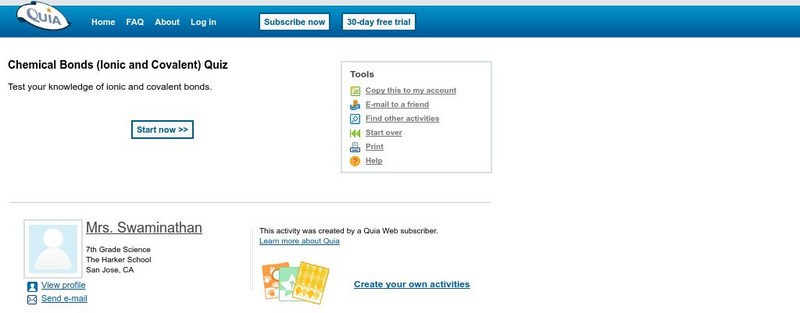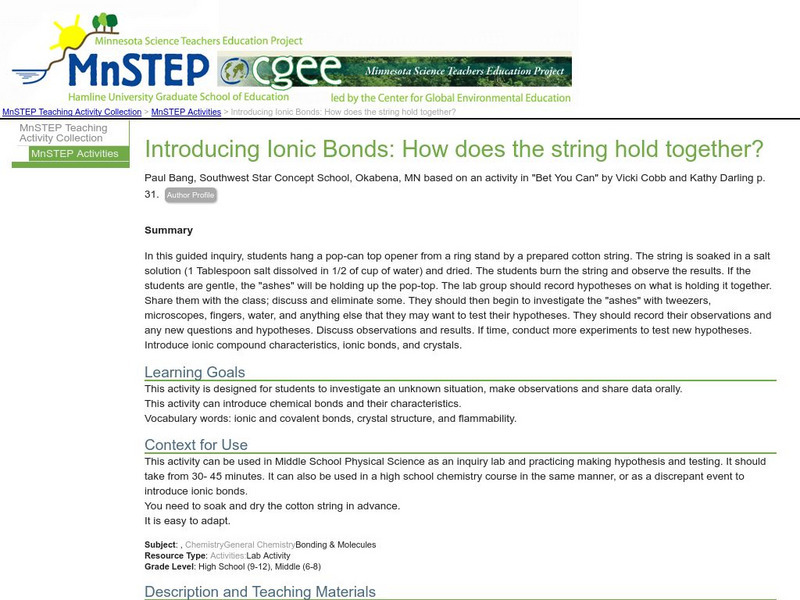University of Southern California
Atomic Bonds
This slide show on atomic bonds contains several slides on electron affinity. Other topics include covalent, Sigma and Pi bonds, and atomic bonding in solids.
John Wiley & Sons
Concepts in Biochemistry: Concept Reviews: Water, P H, and Non Covalent Bonding
A detailed review of water and its structure. Included are diagrams, animated graphics, and review quizzes. For the advanced high school student.
CK-12 Foundation
Ck 12: Chemistry: Bond Polarity
[Free Registration/Login may be required to access all resource tools.] Covers polarity and covalent bonds.
CK-12 Foundation
Ck 12: Polarity and Intermolecular Forces
[Free Registration/Login may be required to access all resource tools.] The following online tutorial describes how the electronegativity difference between two atoms in a covalent bond results in the formation of a nonpolar covalent,...
Wisc-Online
Wisc Online: Lewis Dot Structures of Covalent Compounds
Short slide show provides basic information about drawing Lewis dot structures for covalent compounds. Starts with anatomy of the atom, and then shows the relationship between atomic particles and the Periodic Table of Elements. Offers...
Khan Academy
Khan Academy: Biology: Chemistry of Life: Chemical Bonds
Review over covalent, hydrogen, and ionic bonding in this article. Learn how molecules are held together by chemical bonds.
Texas Education Agency
Texas Gateway: Nomenclature: Covalent Compounds
Given descriptions, diagrams, or scenarios, students will write and name the chemical formulas of binary covalent compounds.
Khan Academy
Khan Academy: Bond Hybridization
Practice determining the hybridization for atoms in covalent compounds. Use the interactive scratch pad to work out the problems.
Frostburg State University
General Chemistry Online: Ionic and Molecular Compounds
Provides a good outline of the concepts involved in ionic and covalent bonding, with links to definition of terms. Features a list of common molecular compounds and a chart that compares ionic and molecular compounds.
Quia
Quia: Reading Detective: Main Idea
A 20 question quiz testing knowledge of ionic and covalent bonding.
Chem4kids
Chem4 Kids: Atoms: Bonding
The website provides a basic explanation of why and how atoms bond together through a covalent bond. Examples with pictures given.
Sophia Learning
Sophia: Multiple Covalent Bonds: Lesson 2
This lesson will explain how multiple bonds are formed. It is 2 of 2 in the series titled "Multiple Covalent Bonds."
Chiral Publishing
Chiral Publishing: An Introduction to Chemistry: Compounds and Chemical Bonds: Audio Book
Did you ever wonder how or why atoms bond together? This interactive tutorial sheds some light on why bonds form and the difference between ionic and covalent bonds.
American Chemical Society
Middle School Chemistry: Represent Bonding With Lewis Dot Diagrams
Students draw and interpret Lewis dot diagrams for individual atoms and both covalent and ionic compounds.
American Chemical Society
Middle School Chemistry: Chapter 4: The Periodic Table and Bonding
Six middle school chemistry lessons about the periodic table and bonding complete with handouts and animations.
University of Arizona
University of Arizona: Bonds Tutorial
A tutorial on covalent bonds and intermolecular forces. A good summary weak forces, including Van der Waals forces and an excellent illustration showing the relative strengths of different forces and bonds.
Simon Fraser University
Chem1 Virtual Textbook: Models of Chemical Bonding: Why Do Atoms Join Together?
The General Chemistry Virtual Textbook, or Chem 1, is broken into several sections covering various aspects of topics related to chemistry. This section deals with chemical bonds and seeks to answer the question, why do chemical bonds form?
CK-12 Foundation
Ck 12: Polarity in Chemical Bonds
[Free Registration/Login may be required to access all resource tools.] Students will determine the polarity of a chemical bond using the electronegativity chart, and then distinguish between nonpolar covalent, polar covalent, and ionic...
Quia
Quia: Chemical Bonds (Ionic and Covalent) Quiz
This is 21-question multiple choice quiz over chemical bonds was written for a 7th-grade science class.
Science Education Resource Center at Carleton College
Serc: Introducing Ionic Bonds: How Does the String Hold Together?
This inquiry activity introduces chemical and ionic bonds and allows students to investigate an unknown situation, make hypotheses, and share data.
Oklahoma State University
Oklahoma State University: Bonding Rules of Thumb
Simple rules to help students identify types of chemical bonding.
Chiral Publishing
Chiral Publishing: An Introduction to Chemistry: Molecular Structure: Audio Book
This audio book, narrated by Mark Bishop, describes the formation of covalent bonds. Lewis dot structures help highlight the valence electrons used to determine which bonds form. Also find links to animations and tutorials about other...
CK-12 Foundation
Ck 12: Physical Science: Chemical Bond
[Free Registration/Login may be required to access all resource tools.] Definition of a chemical bond, why they form and the different types.
CK-12 Foundation
Ck 12: Chemistry: Chemical Bond
[Free Registration/Login may be required to access all resource tools.] Definition of a chemical bond, why they form and the different types.
Other popular searches
- Ionic and Covalent Bonding
- Covalent Bonding Lab
- Covalent Bonding Activity
- Coordinate Covalent Bonding
- Ionic Covalent Bonding
- Covalent Bonding Bhopal
- Covalent Bonding Water
- Polar Covalent Bonding
- Ionic vs. Covalent Bonding
- Covalent Bonding Worksheet
- Ionic vs Covalent Bonding





